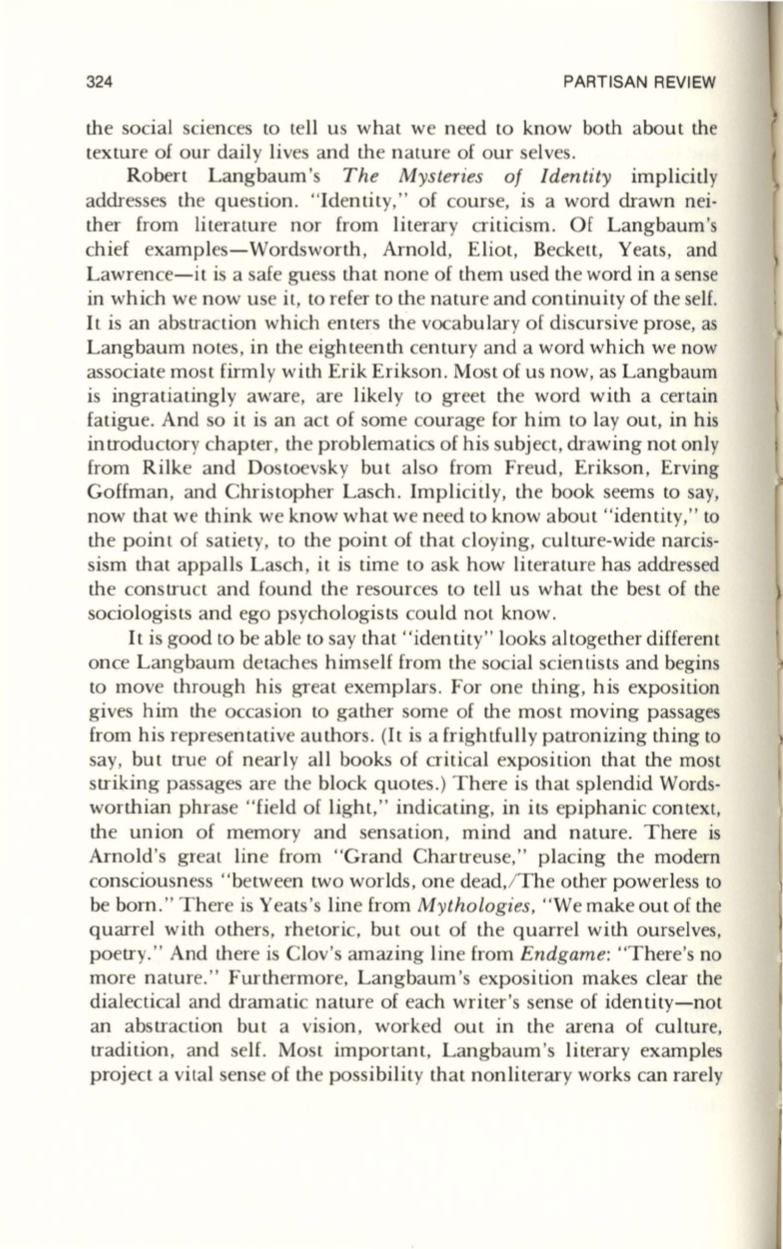
324
PARTISAN REVIEW
the social SCIences to tell us what we need to know both about the
texture of our daily lives and the nature of our selves.
Robert Langbaum's
The Mysteries of Identity
implicitly
addresses the question. " Identity," of course, is a word drawn nei–
ther from literature nor from literary criticism. Of Langbaum 's
chief examples-Wordsworth, Arnold, Eliot, Beckett, Yeats, and
Lawrence-it is a safe guess that none of them used the word in a sense
in which we now use it,
to
refer to the nature and continuity of the self.
It
is an abstraction which enters the vocabulary of discursive prose, as
Langbaum notes, in the eighteenth century and a word which we now
associate most firmly with Erik Erikson. Most of us now, as Langbaum
is ingratiatingly aware, are likely to greet the word with a certain
fatigue. And so it is an act of some courage for him to layout, in his
introductory chapter, the problematics of his subject, drawing not only
from Rilke and Dostoevsky but also from Freud, Erikson, Erving
Goffman, and Christopher Lasch . ImpliciiIy, the book seems to say,
now that we think we know what we need to know about " identity, "
to
the point of satiety,
to
the point of that cloying, culture-wide narcis–
sism that appalls Lasch , it is time to ask how literature has addressed
the construct and found the resources to tell us what the best of the
sociologists and ego psychologists cou ld not know.
It
is good to be able to say that "identity" looks altogether different
once Langbaum detaches himself from the social scientists and begins
to
move through his great exemplars. For one thing, his exposition
gives him the occasion to gather some of the most moving passages
from his representative authors.
(It
is a frightfully patronizing thing to
say, but true of nearly all books of critical exposition that the most
striking passages are the block quotes .) There is that splendid Words–
worthian phrase "field of light," indicating, in its epiphanic context,
the union of memory and sensation, mind and nature. There is
Arnold 's great line from "Grand Chartreuse, " placing the modern
consciousness "between two worlds, one dead/ The other powerless to
be born ." There is Yeats's line from
Mythologies,
"We make out of the
quarrel with others, rhetoric, but out of the quarrel with ourselves,
poetry." And there is Clov's amazing line from
Endgame:
"There's no
more nature. " Furthermore, Langbaum 's exposition makes clear the
dialectical and dramatic nature of each writer 's sense of identity-not
an abstraction but a vision, worked out in the arena of culture,
tradition , and self. Most important, Langbaum 's literary examples
project a vital sense of the possibility that nonliterary works can rarely


